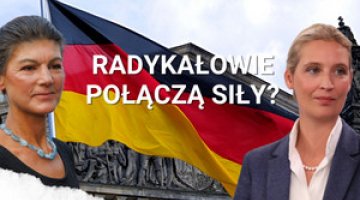The political manifesto of the Alternative for Germany – the sum of all fears
The Alternative for Germany (AfD) is the first party in Germany to present its manifesto for the parliamentary election in 2017. This will have a strong impact on Berlin’s policy and the way the election campaign will be conducted in Germany. The AfD, which is currently polling at 14% (on the national scale) will force the other groupings to express their stance on issues which it has defined as the most important problems and challenges Germany needs to face. The AfD’s manifesto covers fourteen pages and is a challenge to the German political establishment and international organisations (especially the European Union), claiming that decision-making needs to be returned” to German citizens and the German state.
The AfD’s manifesto, which was adopted at the party’s congress in late April/early May, is intended to put a symbolic end to the period of ideological disputes and personal disagreements inside the party. The party has already experienced a split since its establishment in 2013, as a consequence of which its founder, Bernd Lucke, left. The topics which the AfD has focused on in an attempt to earn political capital have also been changing. At the beginning it was the eurozone crisis, then the migration crisis, and the most recent topic is the Islamic threat. The party has modified its urban image towards a more radical one. The views expressed by the AfD’s leaders have differed significantly, depending on the leader; and this has allowed the party to respond in a flexible manner to current developments and to adjust the party’s profile to existing circumstances. The fact that the party has adopted its first manifesto more than a year ahead of the election to the Bundestag is intended to build an image of the AfD as a grouping which can present a consistent option to voters.
The leitmotifs
The offer expressed in the AfD’s manifesto directly draws upon nostalgia for the times of the former Bundesrepublik (without precisely stating what time they mean) – an economically and socially stable state. The party has managed to list in its manifesto most of the fears, concerns, prejudices and grudges the German public share. The strength of this manifesto is based not on suggestions of concrete solutions but on the fact that it has noticed and defined the problems which some voters feel have been hushed up by other political parties for the sake of political correctness.
In the part concerning foreign and security policy, the AfD appeals for Germany strong independent position on the international arena to be rebuilt. The factors that are expected to contribute to this include Germany’s permanent membership in the UN Security Council, verifying each time whether engagement as part of NATO serves German interests, and reinforcing the Bundeswehr. The manifesto emphasises the importance of relations with Russia (“security in Europe is impossible without Russia”), but it does not include such pro-Russian accents as justification of the annexation of Crimea which have been heard from some activists of the AfD. The AfD categorically rejects Turkey’s membership in the EU, and has made consent for it to join any potential government coalition dependent on accepting this demand. It has insisted that the EU should relinquish most of its present competences to the member states. Unless this proposal is met, the AfD will make efforts towards taking Germany out of the EU or replacing the EU with a new economic organisation. In the AfD’s opinion, Germany should leave the eurozone. If the Bundestag does not do that, the party wants a referendum to be held to decide on this issue.
The AfD claims that the greatest threat to the country’s internal security is posed by illegal immigration and Islam, which is not ‘part of Germany’, contrary to what Angela Merkel says. Minarets, muezzin calls and women’s full-face veils should be banned, as should the ritual slaughter of animals. Muslim organisations still should not be granted public juridical person status (this would enable them to apply for financing from taxes paid by Muslims). The influx of immigrants capitalising on the asylum system should be curbed, and asylum applications should be submitted outside Germany.
The AfD’s political manifesto also draws upon conservative values, emphasising the significance of the traditional family model and criticising gender equality policy, gender parities and ‘wrongly understood’ feminism. It also opposes abortion being financed from public funds.
As regards the economy, the AfD principally favours the laissez-faire solutions (for example, the cancellation of the subsidies for renewable energy sources, tax reductions and a curb on bureaucracy). These are, though, on condition that they do not come into conflict with the rules of the social market economy. The party wants to maintain the minimum wage and to increase state support to large families.
A problem for the other parties
The AfD is supported by 14% of the German public, and the other German political parties will have to put forward their own solutions to the problems it has defined. Attempts to ignore the AfD, to pass over them in silence and to marginalise them have proven unsuccessful – on the contrary all this has added credibility to the AfD narrative about the establishment’s political and media conspiracy. Meanwhile, the AfD’s real influence on German policy on the federal states level has long been a fact. The grouping, which has attracted other parties’ electorates and which has won seats in local parliaments, has made it significantly more difficult to build government coalitions. A coalition consisting of representatives of Christian Democrats, Social Democrats and Greens (this configuration has been referred to as ‘Kenyan’, because the combined party colours are those of the Kenyan flag) was formed for the first time in history in Saxony-Anhalt after the local election on 13 March 2016. A coalition of this kind would be impossible on the federal level. However, local elections have proven that the AfD’s electoral results restrict the room for manoeuvre for the traditional parties attempting to form a parliamentary majority. Since the AfD is not taken into account as a coalition partner, the party which wins the election has no other choice but to co-operate with the remaining groupings, and the victorious grouping has a much weaker negotiating position and is thus forced to accept its coalition partners’ unreasonable demands. As a consequence, the party’s electorate becomes disappointed with it. This mechanism may also be at work after subsequent local elections and even the election to the Bundestag in 2017.
The only solution – and the CDU and the SPD seem to have noticed this already – is to stop disregarding the issues raised by the AfD. A few examples suggest that the Christian Democrats and the Social Democrats have already recognised this need. In mid April, the heads of the coalition parties agreed to pass an integration act and to further strengthen the law enforcement agencies’ powers to combat terrorism (the lack of integration and terrorism were until recently treated as completely separate issues). In turn, the Ministry of Labour led by Andrea Nahles (SPD) has developed a draft act restricting the right of EU citizens staying in Germany to receive social benefits. Meanwhile, the CSU insists on following Austria’s example by adopting an act regulating the functioning of Islam in Germany. It is still worth remembering that the CSU has competed for the AfD’s electorate since the beginning of the latter’s existence and has appealed to Chancellor Merkel to take a turn to the right. In turn, the CSU one more time in its history is suggesting that it will expand its activity from Bavaria to the rest of Germany and hopes to attract some of the AfD’s electorate.
It is difficult to predict whether these attempts will cause an erosion of the AfD’s electorate since their sympathies –according to polls so far conducted – are not strongly rooted. However, the Alternative for Germany, which was struggling for survival, with a mere 3% level of support after the schism, has proven that it is moving more and more confidently in German politics and is able to capitalise on public sentiment more and more skilfully.





